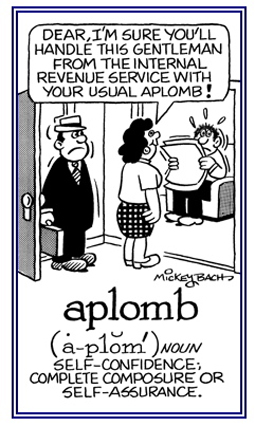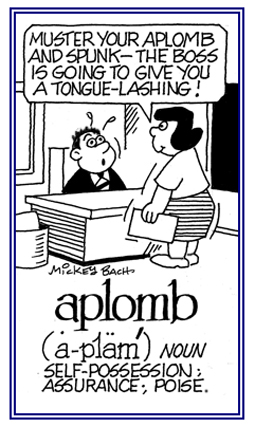plumb-, plumbo-, plumbi- +
(Latin: lead, the metal; Pb)
2. Great coolness and composure under stress: Hank's nonchalance and aplomb during hard times has always been his best character trait.
3. Self-confident assurance; poise: Samuel conducted the business meeting with his characteristic aplomb or calmness.
James was told to use aplomb even when he was under the most difficult pressures to complete his homework for school.
4. Etymology: from French; literally, "perpendicularity", from the phrase à plomb, "poised upright, balanced"; literally, "on the plumb line"; from Latin ad-, "to" + plomb, "lead weight"; and from Latin plumbum, "(the metal) lead"; of which the weight at the end of a line was made.

Go to this Word A Day Revisited Index
so you can see more of Mickey Bach's cartoons.
2. A small piece of lead, on the end of a cord or piece of string, used especially by carpenters and masons to determine a true vertical: The builders used a plumb quite often so they could be sure that the structure was straight and not leaning.
When Aaron had to survey the site of the accident, he didn't have a professional plumb with him; so, he improvised and used the seed of a plum suspended from a string.
2. Of or relating to the position of an object or structure which is vertical; as determined by a plumb bob (weight attached to a plumb line measuring its vertical center): "The carpenter determined that the walls were off plumb or leaning and not straight."
2. In the U.S., informal and old-fashioned; to a complete degree or completely: "She plumb forgot to bring the book with her."
"They were plumb exhausted after the long walk."
2. A weight on the end of a line, used especially by masons and carpenters to establish a true vertical.
3. That which is in a vertical or a perpendicular line.
The vials are filled with liquid, and an air bubble is left to aid in the determination of the horizontal plane and highest vertical point.
2. To test the verticality or alignment of something with a plumb.
3. To straighten or make perpendicular: "The mason will plumb up the chimney to make sure that it is straight."
4. To examine closely or deeply; to probe; that is, to succeed in fully understanding something, especially something mysterious: "The scientist spent his life plumbing the minds of criminals."
5. To seal with lead; for example, to equip something with plumbing, seal pipes with lead, or to work as a plumber: "The plumber is almost finished plumbing her apartment."
6. Etymology: the verbal use in English of "sound the depths" comes from the use of a line weighted with lead (a plumb line) to measure the depth of water and from the use of a similar line to determine the vertical positions of structures, etc.
2. Graphite; a soft, steel-gray to black, hexagonally crystallized allotrope of carbon with a metallic luster and a greasy feel, used in lead pencils, lubricants, paints, and coatings; which is fabricated into a variety of forms; such as, molds, bricks, electrodes, crucibles, and rocket nozzles. Also called black lead.
3. A drawing made by an instrument with a lead point.
2. Someone who installs and repairs pipes and plumbing; originally, simply a "worker in lead"; but eventually, since water pipes were once made of lead, a "pipe-layer".
The Romans used lead pipes, and the word plumber comes from the Latin word plumbum, "lead".
There is no Latin, or even Indo-European, etymology for plumbum but it bears a distant similarity to the Greek word for lead, the standard form of which, molubdos, gives us the name of a chemical element in the Periodic Table, molybdenum. Two non-standard forms, molibos and especially bolimos, are even more similar to Latin.
2. The work, trade of a plumber, or the occupation of a plumber who installs and repairs pipes and fixtures for water or gas or sewage in buildings.

